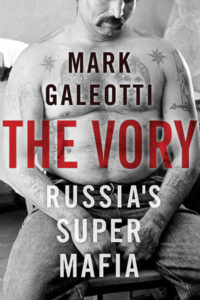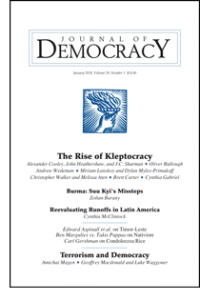
Mark Galeotti’s timely account of the Russian underworld – The Vory: Russia’s Super Mafia – charts its rise from Soviet-era gangsters to Kremlin collaborators under Vladimir Putin, notes analyst Oliver Bullough:
In Soviet times, the authorities used thieves to move things around, to supply booze for parties and to find “deficit” goods for cities that the plan had neglected. Now the Kremlin relies on thieves to fill more significant roles. The hackers who targeted the US election are thieves in a new guise: patriotically undermining foreign political systems one day, stealing credit card numbers the next. The men who undermined Ukrainian rule in Crimea quickly went back to the rackets that were their day job once Russia’s control was secured.
 “Galeotti’s book adds vital texture to the description of Russia as a kleptocracy,” Bullough writes for the Guardian. “He sees it as a country where there is no meaningful distinction between crime, politics and law enforcement. All three are versions of each other, with individuals playing different roles depending on the requirements of the moment.”
“Galeotti’s book adds vital texture to the description of Russia as a kleptocracy,” Bullough writes for the Guardian. “He sees it as a country where there is no meaningful distinction between crime, politics and law enforcement. All three are versions of each other, with individuals playing different roles depending on the requirements of the moment.”
Kleptocratic regimes use corruption as a means of control at home and a weapon of influence abroad, according to a new Hudson Institute analysis. Russian oligarchs and other Kremlin agents have become adept at exploiting the global financial system to launder illicit funds and convert them into new forms of power projection, including attacks on Western democratic institutions, according to Kleptocracy Initiative analysts Ben Judah and Nate Sibley.
 The threat posed by Russian kleptocracy should not be measured only by the objectives that its representatives may have achieved so far. Russian interference, however limited, has the capacity to delegitimize U.S. elections and institutions, inflicting lasting damage on U.S. credibility internationally, they write in Countering Russian Kleptocracy:
The threat posed by Russian kleptocracy should not be measured only by the objectives that its representatives may have achieved so far. Russian interference, however limited, has the capacity to delegitimize U.S. elections and institutions, inflicting lasting damage on U.S. credibility internationally, they write in Countering Russian Kleptocracy:
The fact that a numerically, economically, and geopolitically inferior rival could interfere with elections in the United States challenges a fundamental line that runs through American thinking: That as long as the United States remains larger in key military metrics, it will be secure. This twentieth century way of thinking, conceptualizing security territorially, ignores American vulnerabilities in an interconnected global community powered by international financial systems, social media, and global news reports.
Join Hudson Institute’s Kleptocracy Initiative on April 17 for a discussion with report authors Ben Judah and Nate Sibley, Charles Davidson, Clay Fuller, and Jeffrey Gedmin. Hudson Institute, Tuesday, April 17, 2018 from 11:00 AM to 12:30 PM, Washington, DC RSVP
 The January issue of the National Endowment for Democracy’s Journal of Democracy features a seven-article cluster on transnational kleptocracy. Within the cluster, Christopher Walker and Melissa Aten explore kleptocracy’s implications for democracy around the globe in “The Rise of Kleptocracy: A Challenge to Democracy.” Alexander Cooley, John Heathershaw, and J.C. Sharman explain how kleptocrats rely on a web of transnational relationships and the complicity of Western fixers to safeguard their ill-gotten gains in “Laundering Cash, Whitewashing Reputations;” and Miriam Lanskoy and Dylan Myles-Primakoff discuss how Russia’s ruling elite use kleptocracy as a tool of domestic political control in “Power and Plunder in Putin’s Russia.” The cluster also features Oliver Bullough on kleptocracy in a globalized world; Brett L. Carter examines the African context; Cynthia Gabriel explores kleptocracy in Malaysia; and Andrew Wedeman offers a perspective from China.
The January issue of the National Endowment for Democracy’s Journal of Democracy features a seven-article cluster on transnational kleptocracy. Within the cluster, Christopher Walker and Melissa Aten explore kleptocracy’s implications for democracy around the globe in “The Rise of Kleptocracy: A Challenge to Democracy.” Alexander Cooley, John Heathershaw, and J.C. Sharman explain how kleptocrats rely on a web of transnational relationships and the complicity of Western fixers to safeguard their ill-gotten gains in “Laundering Cash, Whitewashing Reputations;” and Miriam Lanskoy and Dylan Myles-Primakoff discuss how Russia’s ruling elite use kleptocracy as a tool of domestic political control in “Power and Plunder in Putin’s Russia.” The cluster also features Oliver Bullough on kleptocracy in a globalized world; Brett L. Carter examines the African context; Cynthia Gabriel explores kleptocracy in Malaysia; and Andrew Wedeman offers a perspective from China.







